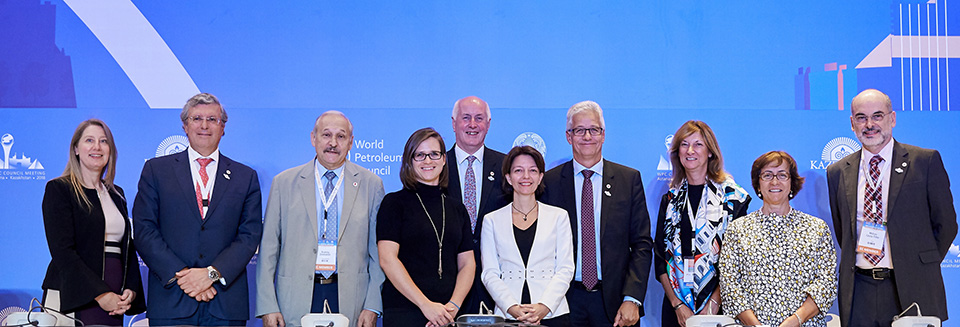
Established in 1933, the World Petroleum Council (WPC Energy) is a non-advocacy, non-political organisation with charitable status in the U.K. and has accreditation as a Non-Governmental Organization (NGO) from the United Nations (UN).
The WPC Energy is dedicated to the promotion of sustainable management and use of the world’s petroleum resources for the benefit of all. The WPC Energy is the only organisation representing the global oil and gas community. The WPC’s Energy prime value to the oil and gas industry today is to catalyse and facilitate dialogue amongst stakeholders that will contribute to finding solutions to key technical, social, environmental and management issues facing the industry.

Executive Committee of the WPC. Astana (Kazakhstan), 2018.
The WPC Energy consists of 65 member countries from around the world representing over 96% of global oil and gas production and consumption. The WPC Energy provides a neutral and non-political forum and its membership is unique as it includes both OPEC and Non-OPEC countries, with representation of National Oil Companies (NOC’s) as well as Independent Oil Companies (IOC’s). Each Country has a National Committee made up of a broad representation of the oil and gas industry in that country, including companies, services, academia, research institutions and government departments.
WPC Energy conducts the triennial World Petroleum Congress, covering all aspects of the industry including management of the industry and its social, economic and environmental impact.
The Secretariat of the World Petroleum Council is based in London, led by the Director General and his dedicated team.
Official website of the World Petroleum Council: www.wpcenergy.org

World Petroleum Council. St. Petersburg, 2019.
Member Countries:
- Algeria
- Angola
- Argentina
- Austria
- Azerbaijan
- Bahrain
- Belgium
- Brazil
- Canada
- China
- Colombia
- Croatia
- Cuba
- Czech Republic
- Egypt
- France
- Germany
- Ghana
- Hungary
- India
- Indonesia
- Iran
- Israel
- Japan
- Kazakhstan
- Kuwait
- Libya
- North Macedonia
- Mexico
- Morocco
- Nigeria
- Norway
- Oman
- Pakistan
- Peru
- Poland
- Romania
- Russia
- Saudi Arabia
- Serbia
- Sierra Leone
- Slovak Republic
- Slovenia
- South Africa
- South Korea
- Spain
- Sudan
- Suriname
- Switzerland
- Thailand
- Trinidad & Tobago
- Türkiye
- United Arab Emirates
- United Kingdom
- Uruguay
- USA
- Venezuela
- Vietnam
On a day to day basis the WPC is administered by the WPC Secretariat.
- Burcu Gunal Director General
- Sarah Ashmore, Director, Programme
- Sarah Beattie, Director, Communications
- Marta Kozlowska, Director, Stakeholder Engagement
- Greta Chapman, Project Coordinator
President: Pedro Miras Salamanca, Spain Senior Vice President: Dr Pinar Oya Yilmaz, USA
Vice President Programme: Mr James McFarland, Canada
Vice President Membership: Dr Li Luguang, China
Vice President Marketing: Dr Talal Al-Bazali, Kuwait
Vice President Diversity, Inclusion and Youth: Mr Jambulat Sarsenov, Kazakhstan
Past Host Representative: Mr Dean Tucker, Canada
Current Host Representative: Mr Mohammad Al Tayyar, Saudi Arabia
Special Advisor for WPC Energy Transformation: Dr Ivan Marten, Spain

- Dr Liu Yuzhang - China
- Prof Frank Behrendt - Germany
- Mr James Nii Boye Quaye - Ghana
- Mr Csaba Zsoter - Hungary
- Mr Yusuke Mochida – Japan
- Mr Bulat Zakirov – Kazakhstan
- Mrs Shayma Al Bannay - Kuwait
- Dr Pandele Neculae - Romania
- Dr Alexey Gromov - Russia
- Mr Goran Stojilkovic - Serbia
- Mr Kutluhan Olcay -Turkey
- Dr Abhishek Deshpande - UK
- Mr David Curtiss - USA
- Mr Mishaal Thukair - Saudi Arabia
- Ms Fathima Packirsaibo - 25th Congress CPC Liaison
- Shamus Hardie – Canada, YP Committee Chai

- Mr Georg Ripperger - Austria
- Mr Karel De Raeve – Belgium
- Mr Kevin Pedrosa - Brazil / Alternate: Ms Juliana Caulo
- Mr Shamus Hardie- Canada (YPC Chair)
- Mr Kai Wang – China
- Mr Jan Mokry - Czech Republic / Alternate: Mr Jonas Hurtik
- Ms Sydney Riegert - Germany
- Mr Marton Takacs – Hungary
- Mr Mostafa Orooji – Iran
- Mr Zhantemir Sarsenov – Kazakhstan
- Mrs Dalal F Alohali- Kuwait / Alternate: Eng Mohammad Al Rashed
- Ms Hasnaa Lamik - Morocco
- Mr Mathias Dahl Venberget - Norway
- Ms Edyta Stopyra – Poland / Alternate: Mr Patryk Bijak
- Mr Mihai Simionescu – Romania / Alternate: Mr Petre Marcel Maxim
- Ms Anna Svetkovskaya – Russia (YPC Vice Chair) / Alternate: Mrs Anastasia Pushina
- Ms Ahaad Turki - Saudi Arabia
- Ms Jelena Zivic – Serbia
- Ms Martina Valachovicova – Slovakia
- Mr Iñigo Ullibarri – Spain / Alternate: Ms Laura Keelling
- Mr Yümnü Cansin Ersay – Türkiye
- Ms Jing Xiao – UK / Alternate: Ms Georgina MacNaughton
- Dr David Lankford-Bravo – USA / Alternate: Mr Maziar Zarea

The World Petroleum Council has been consistently and successfully cultivating a close and friendly attitude to the topic of young professionals coming to the industry. The WPC initiated an International Youth Forum. It was held in October 2004 in China. The main idea was clearly defined by the motto of the forum: "Youth and Innovation – the Future of the Petroleum Industry".
It was the first major event in the history of the WPC, where young people were given the leading role. Boys and girls who tied their fates with the oil and gas industry got an opportunity to represent different countries and freely exchange their views. Their voices were heard by industry leaders. The speeches of authoritative representatives of the oil and gas industry who came to communicate with young people were very useful and informative.

Since then, the issues of professional development and unleashing the creative potential of the young specialists of the industry have been permanently put on the agenda for the World Petroleum Council as one of the key directions for the development of international cooperation oriented towards a strategic perspective. Youth forums have become regular. They are held in the year preceding the Congresses. The professional problems discussed by the youth are becoming a kind of prologue to the great discussion within the global energy agenda.
After Beijing, the forums of young specialists in the oil and gas industry were held in Paris (France) and New Delhi (India). The fourth WPC Youth Forum was held in 2013 in Calgary (Canada). Three years later, in the fall of 2016, young men and women with an active professional position were welcomed in Brazilian Rio de Janeiro - for the first time, as the Forum of Future Leaders.
The decision of holding the 6th Youth Forum of the WPC in St. Petersburg was made unanimously by the results of the WPC meeting in Istanbul on July 9th, 2017. On April 13, 2018, in Oslo, an Official Ceremony of signing a contract between the RNC WPC Association and the WPC was held to organize the 6th Future Leaders Forum in St. Petersburg.
The 6th Youth Forum of the World Petroleum Council – Future Leaders Forum worked in St. Petersburg on June 23 - 28, 2019. The Forum was attended by more than 1300 representatives of the oil and gas industry from 62 countries. The high professional level of the discussions was predetermined by the unique composition of the speakers — most of the 235 speakers have extensive practical experience in leading oil and gas companies or are eminent experts. Ministerial delegations from five countries arrived to communicate with young professionals.
The VII Youth Forum of the Ministry of Internal Affairs was held from September 29 to October 2, 2022 at KBTU. Participants, including industry experts and young professionals, discussed topics related to the energy transition and the future of the global oil and gas industry. More than 700 delegates from 29 countries attended the event, which featured over 20 sessions with 112 speakers.
In 2025, the VIII Youth Forum will take place from October 22-24 in Kuwait. The program for this upcoming event is currently being finalized. If you have questions about participating, please contact the RNC WPC Youth Committee.


